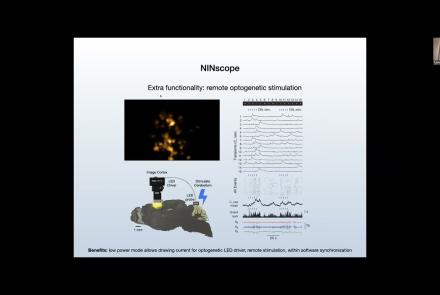Course:
This lesson gives an introduction to high-performance computing with the Compute Canada network, first providing an overview of use cases for HPC and then a hands-on tutorial. Though some examples might seem specific to the Calcul Québec, all computing clusters in the Compute Canada network share the same software modules and environments.
Difficulty level: Beginner
Duration: 02:49:34
Speaker: : Félix-Antoine Fortin
This lesson provides a short overview of the main features of the Canadian Open Neuroscience Platform (CONP) Portal, a web interface that facilitates open science for the neuroscience community by simplifying global access to and sharing of datasets and tools. The Portal internalizes the typical cycle of a research project, beginning with data acquisition, followed by data processing with published tools, and ultimately the publication of results with a link to the original dataset.
Difficulty level: Beginner
Duration: 14:03
Speaker: : Samir Das, Tristan Glatard
Course:
This talk presents an overview of CBRAIN, a web-based platform that allows neuroscientists to perform computationally intensive data analyses by connecting them to high-performance computing facilities across Canada and around the world.
Difficulty level: Beginner
Duration: 56:07
Speaker: : Shawn Brown
This lesson provides an introduction to the lifecycle of EEG/ERP data, describing the various phases through which these data pass, from collection to publication.
Difficulty level: Beginner
Duration: 35:30
Speaker: : Kateřina Vařeková
In this lesson you will learn about experimental design for EEG acquisition, as well as the first phases of the EEG/ERP data lifecycle.
Difficulty level: Beginner
Duration: 30:04
Speaker: : Kateřina Vařeková
This lesson provides an overview of the current regulatory measures in place regarding experimental data security and privacy.
Difficulty level: Beginner
Duration: 31:00
Speaker: : Kateřina Vařeková
In this lesson, you will learn the appropriate methods for collection of both data and associated metadata during EEG experiments.
Difficulty level: Beginner
Duration: 29:14
Speaker: : Kateřina Vařeková
This lesson goes over methods for managing EEG/ERP data after it has been collected, from annotation to publication.
Difficulty level: Beginner
Duration: 39:25
Speaker: : Kateřina Vařeková
In this final lesson of the course, you will learn broadly about EEG signal processing, as well as specific applications which make this kind of brain signal valuable to researchers and clinicians.
Difficulty level: Beginner
Duration: 34:51
Speaker: : Kateřina Vařeková
Course:
This lecture covers FAIR atlases, including their background and construction, as well as how they can be created in line with the FAIR principles.
Difficulty level: Beginner
Duration: 14:24
Speaker: : Heidi Kleven
This lesson discusses the need for and approaches to integrating data across the various temporal and spatial scales in which brain activity can be measured.
Difficulty level: Beginner
Duration: 1:35:37
Speaker: : Leon Martin & Leon Stefnovski
This lesson consists of lecture and tutorial components, focusing on resources and tools which facilitate multi-scale brain modeling and simulation.
Difficulty level: Beginner
Duration: 3:46:21
Speaker: : Dionysios Perdikis
In this talk, challenges of handling complex neuroscientific data are discussed, as well as tools and services for the annotation, organization, storage, and sharing of these data.
Difficulty level: Beginner
Duration: 21:49
Speaker: : Thomas Wachtler
This lecture describes the neuroscience data respository G-Node Infrastructure (GIN), which provides platform independent data access and enables easy data publishing.
Difficulty level: Beginner
Duration: 22:23
Speaker: : Michael Sonntag
Course:
Overview of the content for Day 1 of this course.
Difficulty level: Beginner
Duration: 00:01:59
Speaker: : Tristan Shuman
Course:
Best practices: the tips and tricks on how to get your Miniscope to work and how to get your experiments off the ground.
Difficulty level: Beginner
Duration: 00:53:34
Course:
This talk delves into challenges and opportunities of Miniscope design, seeking the optimal balance between scale and function.
Difficulty level: Beginner
Duration: 00:21:51
Speaker: : Susie Feng, Zach Pennington, Tycho Hoogland
Course:
Attendees of this talk will learn aobut computational imaging systems and associated pipelines, as well as open-source software solutions supporting miniscope use.
Difficulty level: Beginner
Duration: 00:17:56
Speaker: : Susie Feng, Zach Pennington, Laura Waller
Course:
This talk covers the present state and future directions of calcium imaging data analysis, particularly in the context of one-photon vs two-photon approaches.
Difficulty level: Beginner
Duration: 00:21:06
Course:
In this talk, results from rodent experimentation using in vivo imaging are presented, demonstrating how the monitoring of neural ensembles may reveal patterns of learning during spatial tasks.
Difficulty level: Beginner
Duration: 00:19:43
Speaker: : Susie Feng, Zach Pennington, William Mau
Topics
- Artificial Intelligence (5)
- Philosophy of Science (5)
- Notebooks (1)
- Connectomics (1)
- protein-protein interactions (1)
- Extracellular signaling (1)
- Animal models (2)
- Assembly 2021 (27)
- Brain-hardware interfaces (12)
- Clinical neuroscience (3)
- International Brain Initiative (2)
- Repositories and science gateways (5)
- Resources (5)
- General neuroscience
(9)
- General neuroinformatics
(4)
- Computational neuroscience (65)
- Computer Science (5)
- Genomics (1)
- Data science (7)
- (-) Open science (11)
- Project management (6)
- Education (1)
- Neuroethics (25)




















